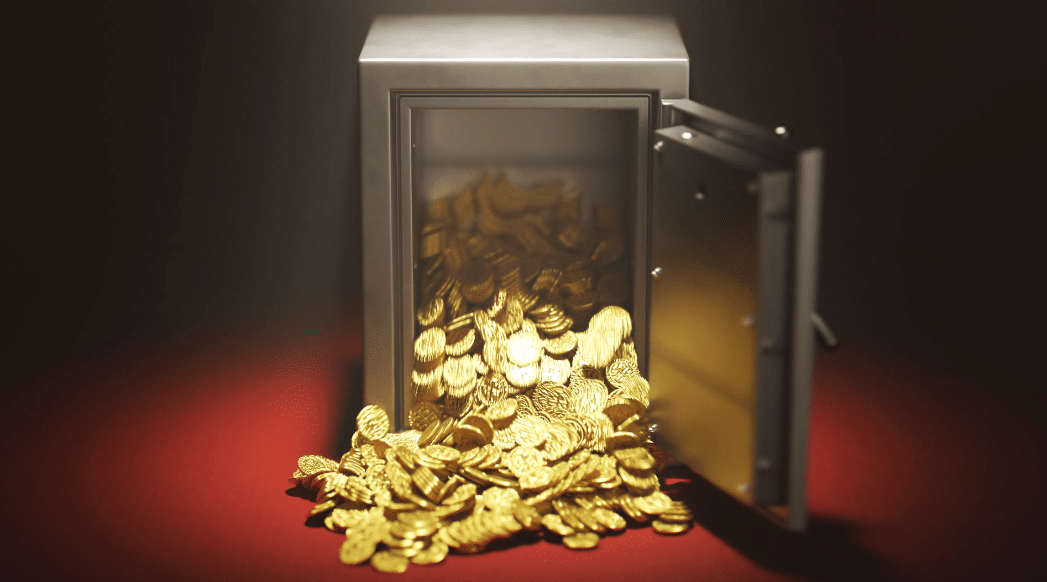Is Buying Gold Coins Taxable?

Navigating the glistening seas of gold coin investment can seem as complex as deciphering an ancient pirate map. You're probably wondering, 'Is buying gold coins taxable?' Well, you're about to sail into the heart of the matter.
The tax implications of purchasing gold coins may vary based on the types of gold investments to their respective taxation rules. There are the advantages of tax-free gold coins and the potential pitfalls of international gold coins. To gain a deeper understanding of this subject, we will cover:
- Tax Planning for Gold Investments
- What are the taxes on gold and other precious metals?
- Taxes and Limits on Selling Precious Metals
- How are different forms of gold taxed
By the time you're done, you'll have a treasure chest of knowledge about planning your taxes when investing in gold. So, brace yourself for a golden journey into the realm of taxes and precious metals.

Tax Planning for Gold Investments
When strategizing your gold investments, it's crucial to consider potential tax implications.
One approach to minimizing capital gains taxes is to steer clear of physical assets, such as gold coins or bullion.
Additionally, holding onto your investments for a minimum of one year and contemplating a 1031 exchange are effective tax planning methods.
Physical Assets - Best Practices
Unless you investing in physical gold through a tax-deferred gold IRA, you shouldn't invest in physical assets like gold coins or bullion. We will cover gold IRA much more later in the article.
The IRS considers these as collectibles and taxes them at a higher rate of 28%, compared to the maximum 20% rate for regular capital gains. Instead, consider the following options:
- Invest in ETFs and Mutual Funds: These assets typically avoid physical gold, and hence, are taxed at the standard capital gains rate.
- Consider Futures Contracts and Options: These are treated as ordinary capital gains, not physical assets, resulting in a lower tax rate.
- Seek Professional Advice: Tax planning can be complex, so consulting a tax professional could help you strategize better.
Hold your investments for at least one year
If you hold your gold investments for at least one year, you'll be taxed at a lower capital gains rate. This is because the Internal Revenue Service (IRS) considers the profit from selling any investment, including gold coins, as a short-term capital gain if it's sold within a year of purchase. These gains are taxed as ordinary income, which could be as high as 37% for single taxpayers earning over $539,900 in 2023. For joint filers, this rate applies to income over $693,750.
Thus, to minimize your tax liability, consider holding onto your gold investments for at least a year before selling. This strategy allows you to take advantage of the lower long-term capital gains tax rates, resulting in potentially significant tax savings.
Consider a 1031 exchange
To minimize your tax impact from selling gold, you can consider a 1031 exchange, which allows you to reinvest the profits into a similar asset without an immediate tax burden. This mechanism offers you a way to defer the capital gains tax, thanks to the flexibility it provides.
Here are a few points to keep in mind:
- You must reinvest the profits into a similar asset, such as precious metals, within 45 days of selling your gold.
- An intermediary must hold the funds during the transition to avoid immediate taxation.
- Remember, a 1031 exchange is beneficial if you're planning to reinvest your gold profits, not if you're aiming for cash liquidation.
Plan wisely and you can maximize your gold investment returns while minimizing your tax outlay.
What are the Taxes on Gold and Other Precious Metals?
When it comes to investing in precious metals, you need to consider the impact of Value Added Tax (VAT) and capital gains tax.
VAT can affect the initial outlay for your investment while capital gains tax may be applicable on the profit you make when you sell.
Understanding these taxes will help you plan your investments more effectively.
What is the VAT on Precious Metals?
As you explore the realm of precious metals taxation, it's crucial to consider not just gold, but also silver and platinum group metals (PGMs).
Unlike gold, these metals often attract a Value Added Tax (VAT) in many countries. Therefore, understanding the different tax implications across various precious metals can greatly inform your investment decisions.
Silver and PGM Group Metals
You're not just limited to gold when investing in precious metals; silver and PGM group metals also offer investment opportunities, but they come with their own tax implications.
- VAT rates vary globally; in Europe, they range from 8% to 25% on silver and PGMs.
- Some countries offer VAT-free silver coins.
- In the US, state taxes may apply, but there's no federal tax on precious metals.
What is the Capital Gains Tax on Gold and Other Precious Metals?
In your journey to understand the taxes on gold and other precious metals, it's essential to grasp the concept of capital gains tax. This tax is a fee on the profit you make from selling your precious metals.
For instance, if you're selling gold American Eagle coins, you'll need to consider this tax. Rates vary globally, with countries like Italy charging a 12.5% rate for private investors, while the U.K. applies a tax rate between 10%-28% depending on your income level.
However, there are exceptions, as some countries, like Switzerland, Belgium, or Germany, don't apply this tax on precious metals. In the U.S., physical holdings in gold or silver are subject to a maximum capital gains tax of 28%.
Taxes and Limits on Selling Precious Metals
When you sell precious metals, it's crucial to understand the taxes and limits that apply to your transaction. The profits you derive from such a sale are subject to capital gains tax. The rate you'll pay depends on your income level and the duration you held the asset. If your holding period is less than a year, you'll pay short-term capital gains tax, equivalent to your ordinary income tax rate. However, if you hold the asset for more than a year, you'll pay the lower long-term capital gains tax rate.
In addition to capital gains tax, there are other considerations when selling precious metals. For instance:
- Form 8300 Requirement:Unlike the common belief that a Form 8300 filing is required for transactions over $10,000, this applies mainly when clients purchase from dealers. The criteria for selling can differ based on the type and weight of the product.
- Specific Product Exceptions:Certain products like the American Gold Eagle Coins, and numismatic and semi-numismatic coins, don't require a Form 1099-B.
- Reporting Thresholds:Different thresholds exist for different types of precious metals. For instance, you must report sales of 25 or more ounces of gold, 1,000 or more ounces of silver, or 25 or more ounces of platinum.
Knowing these rules can help you plan your strategy and potentially save on taxes. Always consult with a tax professional to ensure you're complying with all laws and regulations when selling precious metals.

How are Different Forms of Gold Taxed
Understanding the tax implications of various forms of gold is crucial for your overall investment strategy. Whether you're investing in physical gold, digital gold, paper gold or gold derivatives, each carries its own unique tax considerations.
Let's break down how each of these gold investment types is taxed, so you can make more informed decisions about your gold portfolio.
Physical Gold – Private Sale
You'll find that buying physical gold, such as coins or jewelry, involves certain tax implications depending on the duration of your investment. Here's a quick rundown:
- If you sell your gold within three years of purchase, it's considered a short-term capital gain. This gain will be added to your total taxable income and taxed at your current income tax slab rate.
- If you hold onto your gold and sell it after three years, you'll incur a long-term capital gains tax. This tax is levied at 20% , plus a 4% cess, with an additional surcharge if applicable.
- Remember, there's also a 3% GST on the purchase of physical gold, plus making charges for jewelry. And if you're buying gold jewelry over $200,000 in cash, you'll be hit with a 1% TDS.
Physical Gold – Gold IRA
If you intend to buy and hold gold as a long-term investment and do not expect to make regular withdrawals, a gold IRA is one of the best means of owning physical gold. This account functions as a tax-deferred retirement savings account and works like pre-tax traditional IRAs. There is an expansive list of IRS-approved coins that are permitted in a gold IRA
The more pressing question is which gold IRA company to choose. Depending on whether you are a high-net investor looking to take advantage of the best prices or require a lower investment minimum and affordable entry to the gold market, or own the physical gold in your place of residence as well, we have done the due diligence and research for you. See the links at the end of this article to access the free gold investment guides from Gold IRA that we have thoroughly vetted.
Digital Gold
Shifting from physical to digital gold, you'd find that the tax implications are quite similar. Like physical gold, digital gold is taxed based on the duration of the investment. If you decide to sell your digital gold after holding it for 3 years, you're liable for Long Term Capital Gains (LTCG) at a rate of 20%, plus cess and surcharge.
However, if you sell within 3 years, the returns aren't directly taxable. The increasing popularity of digital gold among investors can be attributed to numerous advantages. It requires a lower initial investment, can be purchased online, and eliminates the stress of storing physical gold.
Therefore, while the tax structure remains consistent with physical gold, digital gold offers a more convenient investment option.
Paper Gold
When it comes to paper gold, there are several types you need to be aware of, each with its own tax implications.
- Gold ETFs and Mutual Funds: These are taxed the same as physical gold. If held for more than 3 years, long-term capital gains (LTCG) of 20% plus 4% cess apply. For holdings less than 3 years, the gains are added to your taxable income and taxed according to your income tax slab.
- Sovereign Gold Bonds (SGBs): SGBs have a slightly different tax treatment. The interest you earn is added to your taxable income and charged as per your income tax slab. Importantly, the profits from SGBs, if held until maturity (8 years), are tax-free.
It can not be understated that a thorough review of the gold investment contract is critical. Knowing whether there is enough physical gold to match and support the other open interest contracts and whether that physical gold is allocated or unallocated can mitigate the counterparty risk that is inherent with paper gold products,
Understanding these differences between paper gold investment products that could be over-leveraged and physical gold ownership can help you make informed gold investment decisions.
Tap the banner below to visit Augusta Precious Metals to receive their gold IRA checklist and gold investment guide that can help further understand these differences.
For SGBs
If you're considering investing in Sovereign Gold Bonds (SGBs), there are a few key tax implications you need to understand. SGBs earn an interest of 2.5% annually, which is added to your taxable income and taxed according to your slab. However, profits from SGBs after 8 years are tax-free, making them a potentially advantageous long-term investment.
SGBs come with a lock-in period of 5 years. If you choose to withdraw after this period but before 8 years, your gains will be subject to Long Term Capital Gains (LTCG) tax at 20%, plus a 4% cess. This premature withdrawal tax is an important factor to consider when planning your investment strategy in SGBs.
Therefore, understanding these tax implications can help you make informed investment decisions.
Gold Derivative
You should know that every form of gold investment has its own unique tax implications, and understanding these can greatly affect your overall returns. Gold derivatives, a type of gold investment, offer returns that are taxed differently, especially for businesses.
- If your firm's total turnover is less than ₹2 crore, the returns from gold derivatives can be claimed as business income and are taxed at 6%. This can significantly reduce your tax liability.
- However, if your firm's turnover exceeds ₹2 crore, the returns from gold derivatives can't be included as business income.
- It's essential to understand these tax nuances to optimize your gold investment strategy. Always consider consulting a tax professional to ensure you're complying with the tax laws and maximizing your returns.
Gold as a Gift
Let's delve into the tax implications of receiving gold as a gift, as it's a common practice in many cultures and occasions. If gold is gifted from parents, siblings, or children, it's tax-free. However, if you receive it from someone else and the total gift value hits ₹50,000, you'll have to pay tax as per your income tax slab. Gifts valued under ₹50,000 from anyone are tax-free.
Yet, selling the gifted gold incurs tax at the same rate as physical gold. Therefore, it's essential to understand these tax nuances before accepting such gifts. Remember, gold is a popular investment, but its tax implications can significantly impact your financial planning.
Be sure to choose an investment form that aligns best with your financial goals and tax obligations.
Conclusion
the In conclusion, investing in gold coins can entail certain tax implications. While physical gold is subject to capital gains tax, other forms like paper gold have their own tax structures. Selling precious metals also involves taxes and limits.
However, tax-free gold coins do exist. Understanding these nuances can help you plan your taxes effectively. So, whether you're a seasoned investor or a beginner, being informed about these tax rules is crucial to your gold investment journey.
To learn more about the tax implications of the selling side of the equation and whether gold sales are reported read here.
Find the right company for you. Obtain a gold IRA guide and talk to a broker




If you have 100k in savings to protect and want to take advantage of the best prices, attend a gold educational webinar hosted by Augusta Precious Metals. Tap the button below:
Gold IRA FAQs

Adam ONeill
Author, lifelong investor, and creator of PreciousMetalsInvestmentPortfolio.com

